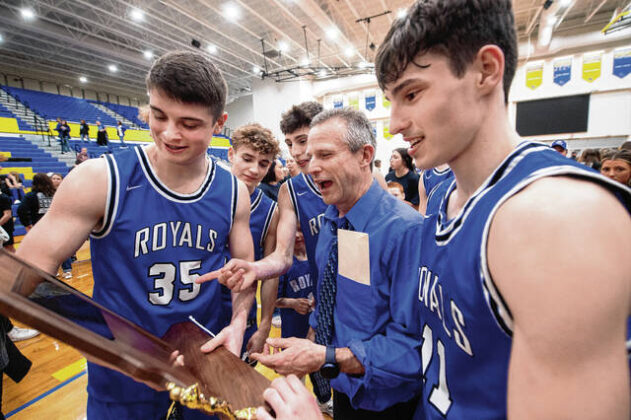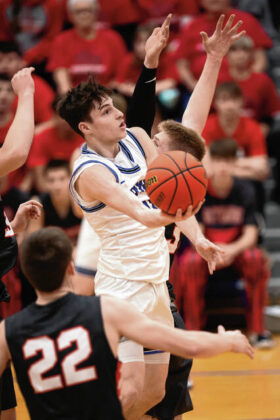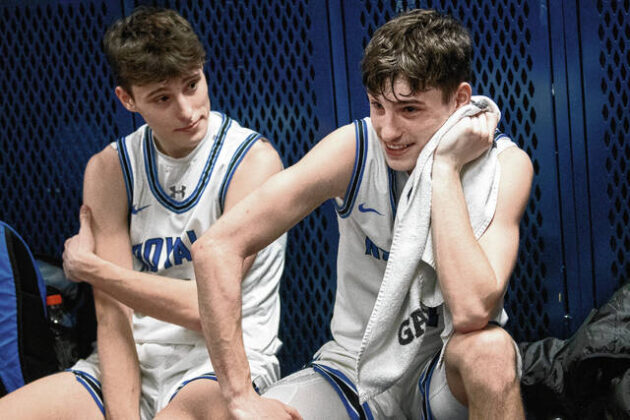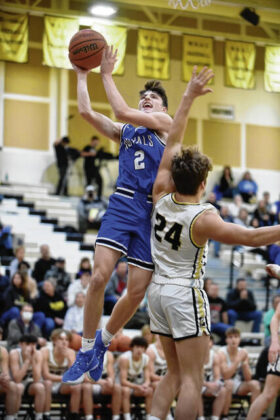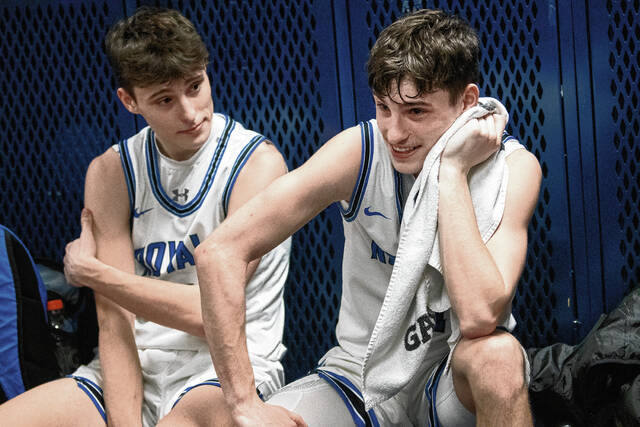
Eastern Hancock’s Silas Spaulding, left, looks over at his brother Jacob Spaulding in the locker room moments after their semifinal victory over Southmont, 63-47, to advance to the Class 2A Regional 11 championship game, Saturday, March 12, 2022.
Tom Russo | Daily Reporter
CHARLOTTESVILLE — The signs were there, but like many parents in the same situation, Aaron Spaulding and his wife, Jennifer, had no idea.
Tending to their oldest twin son, by seven minutes, Silas, who was a 6-year-old, first-grader at the time, the Spauldings’ initial thought was the flu or maybe a lingering cold.
Silas, 17, wasn’t sure what to think either. He just remembers not feeling like himself, and after several days, he wasn’t getting any better.
“I kept falling asleep every time I ate. Falling asleep in class. Using the bathroom a lot. Just foggy, not really knowing what was going on,” recalled Silas Spaulding, now a junior guard for the Class 2A Eastern Hancock Royals. “Then, it was going to the doctor and the hospital. IVs being stuck in me, still not knowing what was going on. I thought I was going to die. I really didn’t know what was going to happen.”
Once Silas’ blood sugar level was tested, the number was revealing and shocking, as was his diagnosis later at Riley Hospital for Children in Indianapolis where he was admitted for nearly a week afterwards.
“His blood sugar was in the 700s and normal is around 120-140,” said Aaron Spaulding, Silas’ father and head coach of the Royals’ boys basketball team. “At the time, we thought, he must just have some bad bug or something. He wasn’t getting any better, so we took him to the doctor, and his numbers were dangerously high. It was a shock because no one, to my knowledge, in my family ever had type 1 diabetes.”
Silas became the first, but he wasn’t the last.
Seven years later, his twin brother, Jacob, then 13 years old, stumbled upon the same diagnosis.
“I was testing my blood sugar for the fun of it because I liked to sometimes, and it kind of seemed high, so we tested it again,” said Jacob Spaulding, a junior guard at Eastern Hancock. “It was the same thing, and Silas and I kind of looked at each other. We went to our dad, and we told him about it. The face he gave me was pure and utter shock.”
After spending the past few years adjusting Silas’ lifestyle and nutrition while also educating themselves on how to inject their son with properly measured insulin shots and monitoring his blood sugar level faithfully, the process started all over again with Jacob.
“We caught it early. I was higher than 200, which is a little bit over the norm, so we caught it right away,” Jacob Spaulding said. “Thankfully, they were able to get it down really quick. I was normal level by that night.”
From that point forward, however, life changed for the twins.
Insulin shots and finger pricks to draw droplets of blood became the norm. One injection with breakfast, another with lunch, same with dinner and three more throughout the day, including one late in the night.
Also diagnosed with celiac disease, a chronic digestive and immune disorder that damages the small intestine, a gluten-free diet was incorporated for the twins and their father, who later tested positive for the disease.
While the family’s bout with celiac disease can be disruptive, their attention remains steadfast on the twins’ type 1 diabetes, especially as student-athletes.
Any major shift in their blood sugar levels can potentially impact their sports performance and mental focus. But, it’s never a deterrent.
“You don’t make any excuses. You get the hand you’re dealt, and you do what you can do with that,” said Silas Spaulding, who is heading to the Seymour South Semistate with the ninth-ranked Class 2A Royals today.
“The one thing we told Silas from the get-go,” Aaron Spaulding added. “This isn’t going to define who you are. This is manageable. This is something you have to work at and an obstacle, but it’s not going to keep you from doing anything that you want to do. We immediately talked about those athletes that have type 1 diabetes and have competed.”
Role models were abundant for Silas as he contended with the disease early on prior to Jacob’s diagnosis.
Aaron Spaulding, a varsity basketball coaching mainstay at Eastern Hancock the past 23 seasons, used the examples set by other high-level athletes with type 1 diabetes such as former NFL quarterback and Indiana native Jay Cutler and former NBA players like Adam Morrison and Chris Dudley.
“People with type 1 diabetes have accomplished great things under the same circumstances,” Aaron Spaulding said. “(My wife) is in the same mindset that this is something that you can deal with, and we’re going to deal with it. Obviously, they need some special provisions here and there, like sometimes leaving class because they need to get carbs, but for the most part, we expect them to be responsible. Most of the time they are. Sometimes, they’re still 17 year olds.”
Silas has honed his mathematical skills over the years as a result. The Royals starter is averaging 10.8 points per game, and he can easily calculate his brother’s 13.9 ppg, but division has become his primary off-court expertise.
“After I was diagnosed, I had to take an hour class twice a day. We had to learn how to give the shot. Learn how to test your blood sugar. You had to learn how to regulate your blood sugar and the math,” Silas Spaulding said.
“I was in advanced math early because I had to learn division early. What you have to do is add up all your carbs and you divide it by a set number. That will give you how many units you give yourself in a shot form.”
There’s little room for error, and Silas is precise when it pertains to calculations, whether involving the timing of an outlet pass on a fast break or whatever his body is telling him in that exact moment.
“If you mess up, you’re blood sugar will get pretty high. Because if you don’t dose yourself when you eat, it will spike and affect how you feel and how you perform in activities like school and sports. You have to make sure you’re on it. There are no slip ups,” Silas Spaulding said.
The responsibility is a shared one for the Spauldings, who actively watch each others’ backs. Both wear small, unnoticeable Dexcom Continuous Glucose Monitoring devices that check their blood sugar levels routinely. Their real-time numbers can be viewed on mobile devices and provides the Spauldings with graphs, detailing the twins’ blood sugar levels at any given time.
In an extreme case, an epinephrine injection can be administered for hypoglycemia.
“We both have these Dexcom devices on our bodies that checks our blood sugar, and my dad is kind of stricter with it, so he’ll check it like 10 times before a game starts,” Jacob Spaulding said. “He always wants to make sure we’re good in case we have to do anything about it.”
Jacob’s learning curve wasn’t quite as severe as Silas’, who immediately supported his twin brother after several years of experience.
“When my brother first got it, I wanted to be a role model for him. I wanted to teach him that it wasn’t the end of the world,” said Silas Spaulding. “If he had questions, I was there for him. I didn’t have that.”
One place where Jacob was surprised to face difficulties was on the court. Silas, who also has asthma, remembers his brother’s first reactions to having diabetes as a player.
“It has affected me at times. When I’m low, I can feel it. I’ve gotten used to playing that way, if it does happen because it can go up and down. When I play sports, I’m usually not physically fatigued. I have asthma, too, so either I’m breathing heavy or I’m low, then back up. It’s one of those two,” Silas Spaulding said.
“The first time Jacob was playing after he was diagnosed, he was low and he said to me, ‘This is hard.’ I said, ‘Yeah, it’s hard when you’re low. All that time you were telling me to suck it up, it’s hard to deal with that. You were playing normal while I was playing a different way. I’m going up and down with my blood sugar, and you were going straight on that line.’”
The key, Silas says, is learning how to regulate the ups and downs. Maintaining a steady level is not realistic, but awareness is required.
“You’re never going to be just set forever. You’re up and down. You just deal with it. If you’re low, you eat. If you’re high, you get a shot. You’re never really going to go straight,” Silas Spaulding remarked.
Typically, no one can tell the difference on the basketball court, as the twins thrive on up-tempo defense and often push the ball up the floor in transition. Their on-going, inspiring battle as diabetic student-athletes has come up a few times, though.
“After the Hagerstown sectional game, one of their kids sent me a DM on Instagram, and he said that he had diabetes and he heard that I had it. It kind of put it in perspective that you’re kind of having an influence on people,” Jacob Spaulding said. “It’s kind of nice to know you’re showing people you can be a good athlete, go to semistate, contribute and be fine with having diabetes.”
Their resolve in the face of adversity is both self-taught and inherited. Aaron Spaulding has contended with keratoconus in both eyes, a disease that affects the structure of the cornea, resulting in loss of vision.
Spaulding, 50, became aware of his condition when he was 22, and five years ago he underwent a cornea transplant with a one-year recovery. He continued to coach throughout the process.
“They literally put 12 stitches around my eye and took one out a month,” Aaron Spaulding said. “Went through that and had a second surgery, a strabismus surgery, about two years after the transplant.”
Spaulding’s strabismus procedure was conducted to correct his left eye muscles and position.
“What happened was my right eye was so much better that the brain starts relying on the right and the left becomes a lazy eye,” Aaron Spaulding said. “Sometimes, it still does that where I might have to have a third surgery at some point. When I got my surgery, I was like 20 over 400, so with that left eye, I couldn’t read the big E (on the chart) if it was close to me. It’s way better than it was.”
No excuses. The Spauldings prefer to be known for overcoming rather than surrendering.
“When that one person comes up to you and says, ‘Hey, I have diabetes, too. I look up to you because I see that you go beyond the limits that people set when you have a disease,’ it’s nice to hear. It’s nice to hear people look up to you for something that you can’t even control. It makes me think, ‘Wow. They actually look up to me for something I struggle with every single day,’” Silas Spaulding said.

